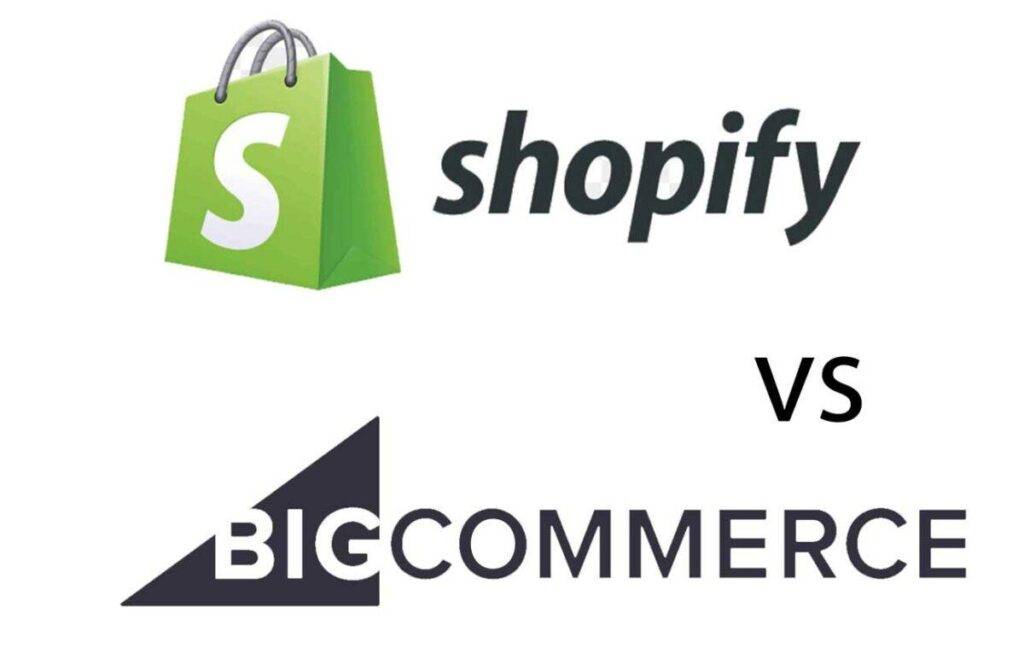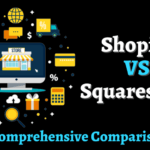Last updated on June 1st, 2023 at 03:31 pm.

In this post we’ll cover Shopify vs BigCommerce , not Shopify vs Big Cartel.
Have you just stepped into the world of online marketing, and you aren’t sure which eCommerce site builder to opt for?
There is no second thought that both Shopify and BigCommerce are valuable platforms that provide you with an online platform to start your business without knowing a bit of coding.
But the problem is that you can’t go for both. At the end of the day, you have to build your online store using only one of them. Nevertheless, here we have brought a detailed comparison between Shopify vs. BigCommerce – Which one is better?
So, without any further ado, let’s dive through the bits of each of these online store builders!
Why Consider Shopify – A General Overview!
Founded in 2006, Shopify is simply a Jack of all trades that provide you with all the necessary features to start your online business from scratch without being an expert.
It acts as your helping hand in both eCommerce and point of sale.
A few eye-catching features of Shopify are:
- Point Of Sales POS
The best and, let me say, the most distinguishing feature of Shopify is POS. Using it, Shopify allows its customers to open both online and physical stores in a single place along with pickup, tipping, and other necessary functionalities.
- SEO Tools
Yet another feature of Shopify is Search Engine Optimisation. Yes, we all know that SEO is crucial for getting accelerated sales and a broader audience.
So, Shopify provides great SEO applications like Smart SEO and Booster Image, and SEO Optimizer to help you increase and generate more traffic.
- Drop-Shipping
In this busy era, who got the time to maintain an active warehouse with all the listed products?
So, Shopify comes with dropshipping, which allows you to buy products from third-party sellers and sell them to your audience. The wholesaler that Shopify is connected to is Aliexpress using Oberlo.
- User-Friendly Interface
Another notable feature of Shopify is its easy-to-use interface. Where most of the platforms come with a very confusing and complicated version of the interface, Shopify provides you with an easy drag and drop featured interface. So, anyone having zero knowledge of coding can have deep hands in Shopify CMS.
So, if you long for an aesthetic-looking site, Shopify has your back.
- Widely Customizable
Shopify is widely Customizable because of the readily available app store. It has an app store of third party plugins/apps. You can use these Shopify apps to customize your store.
Perhaps you are looking for a courses/video hosting solution. You’ll definitely find one in the Shopify app store. Maybe you’re looking for shipping, payment or email marketing solution, you will definitely find a ready made app you can use.
All in all, you can easily customize your store and add more features
Why Consider Bigcommerce – The Perks It Has!
What can be a better introduction to BigCommerce than letting you know that Big names like Toyota, Bliss, and Dress up use it as their eCommerce software?
A few standing out features of BigCommerce are:
- Website Customization
BigCommerce is a highly customizable website that provides various pre-built templates and stencils to build an attractive preview page. Moreover, you can also create your own template using Akamai Manager present in it without spending a penny.
- SEO and Analytics Dashboard
The key feature distinguishing BigCommerce from other service providers is its analytics dashboard. It provides the customers with visibility into the page and product-level performance.
- Payment Gateways
A common problem seen is that most people don’t opt for their favorite service platform due to the payment gateways they use.
Surprisingly, BigCommerce got totally different views. Not only does it provide an option to accept payment from standard gateways like PayPal, Pioneer, Apple Pay, Pay with Amazon, etc., but it also allows you to get paid from nonstandard gateways you prefer without any penalty.
Related: The Best Shopify Alternative
Shopify vs. BigCommerce– A detailed Comparison!
There is no denying that both platforms have earned a respectable place on the top of the E-commerce builder list. So, narrowing it down to choosing one of the two is as difficult as solving a Greek puzzle.
So, to help you come out of the blind road, below comes a detailed comparison between BigCommerce and Shopify which can help you decide the better website builder for your e-commerce website.
- Pricing of Plans
The first question that all the potential users ask is the pricing and plans. So, the pricing of both software ranges from $29 to $299.
The plans of BigCommerce, along with pricing, are
- Standard plan: It costs $29.95 monthly
- Plus plan: $79.95 monthly
- Pro plan: $299.95 monthly
- Enterprise plans are customizable, and hence the price varies.
Related : How to Create Shopify Clothing Store – Free Video Tutorial
On the other hand, the plans of Shopify are
- The Lite plan costs $9 monthly
- The basic plan costs $29 monthly
- Shopify plan cost is monthly $79
- Advanced version of $299 per month
- Shopify plus is customizable and varies according to your requirements
The plans offer almost similar features in both. However, in terms of transaction fees, BigCommerce got the advantage. Shopify has a transaction fee and only 15 staff accounts in the advanced plan. At the same time, BigCommerce provides unlimited staff accounts and no transaction fees in the standard plan. Check out the Shopify pricing page here.
- Easy to use
When considering the interface, Shopify is thousands of times easier to use. So, if you are a beginner, Shopify has an advantage over BigCommerce for you in terms of having a user-friendly interface. It also has a wizard for giving you instructions.
In contrast, BigCommerce comes with a bit of technical and tricky terms to do even a primary task like adding a product. So, to provide a more advanced level of customization, it needs to use more technical terms at the front and backend.
- Themes and Designs
Bracing your website in terms of having an eye-catching front end is necessary so that the customers stop and feel the urge to stay and buy.
BigCommerce offers you a wide range of themes and designs along with customizable options. However, the free themes are a bit outdated. You need to buy the latest themes that cost $150 to $300.
In contrast, in Shopify, you need to buy themes, but they are comparatively much cheaper, costing only $100 to $180. The free version also has a good range. Moreover, they offer a customizable look and a trial test too.
- Sales Features
Both of the service providers provide basic services like SSL certificates, essential shipping tools, and multichannel selling. However, the facts that set BigCommerce at number one are:
- It offers 600 variants per product, while Shopify provides only 100.
- BigCommerce has a partnership with Walmart, while Shopify doesn’t.
- BigCommerce offers unlimited staff accounts, while Shopify doesn’t.
- Dropshipping
Having a consistent dropshipping quality is essential for drop shippers. The products can be easily added to the store and automatically processed.
For this purpose, BigCommerce falls far behind Shopify since Shopify uses Oberlo, the most trusted power tool, and Dropified for dropshipping. Therefore, Shopify’s selection process is the most consistent and quality-based. However, in BigCommerce, another market of decent apps is used. But none of them is competent enough to equalize Oberlo.
- Apps
In Shopify, there are many apps available for adding to your functionality, but they are too expensive.
Contrastingly, Bigcommerce has fewer apps but at a much lower price. So, why not save your money?
- Security
Shopify is secured by SSL and uses HTTPS in its domain for security. Moreover, the stores are also PCI compliant to keep your data safe.
However, in BigCommerce, the servers are PCI DSS certified to level 1, have intrusion detection software, is SSL certified, and operate with fraud-resistant transactions.
Related: How does Shopify work – All About Shopify – For Beginners
Shopify vs BigCommerce Conclusion – Final Thoughts!
Finally, we can say that both BigCommerce and Shopify are excellent online store website builders that work ideally in respective scenarios. If you are a beginner, Shopify hits you right with its easy-to-use interface. And if you are an experienced person, either of the two provides you with extensive features.
So, deciding which one will work best for you is solely in your hands. Consider the differences discussed in this Shopify vs BigCommerce post, and think of the one that provides you with more.
If you choose Shopify, here is a YouTube playlist that will show you how to build a Shopify clothing store.




